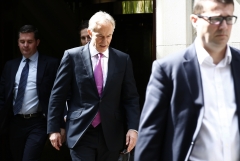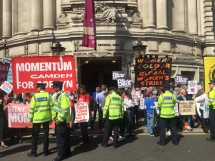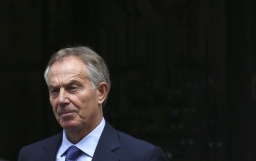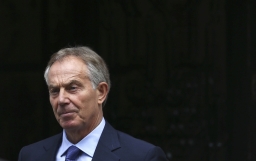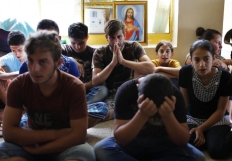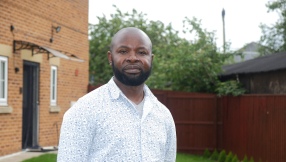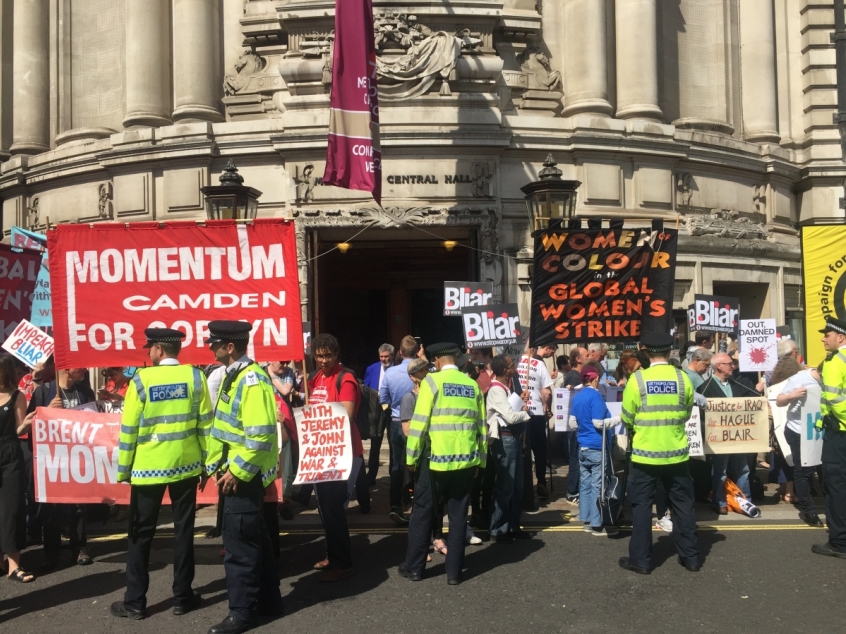
I joined the anti-Iraq war protest in February 2003 at Green Park underground station. I climbed the stairs of the Tube listening to the roar of the crowds and as I stepped out into that freezing cold afternoon I saw a sight like I had never seen before. A stream of people as far as the eye could see behind and before me.
But it wasn't just how many people were there (at least a million, possibly two) but the diversity of groups represented. I saw signs that said "Countryside Alliance Against the War", "Conservative Women Against the War" – and that was before the carnival of sex workers danced past, joyfully raising their objections. This was a protest that spanned class, ethnicity and political party.
We knew we were being sold lies. We felt inside ourselves that this war was unjustified and believed with conviction it was wrong. The idea that there were Weapons of Mass Destruction in Iraq which could be deployed in 45 minutes doesn't just sound ridiculous now, it sounded ridiculous then.
My whole body tingled in excitement and anticipation. It was a breathtaking, beautiful and unified sight. I was joining the largest demonstration in history and it was to become a defining moment of my life.
It was with dismay and anger that I watched how Tony Blair and George Bush dismissed the people's mass demonstrations. One month later thousands of British and US soldiers were marching on Iraqi soil.
The findings of the Chilcot report into the Iraq war, published on Wednesday, are damning: the threats posed by Saddam Hussein were deliberately exaggerated by Blair, British intelligence provided deeply flawed information, little consideration was given to postwar planning and – most crucially for Christians, I believe – peaceful options were not exhausted before the invasion began.
So, the enquiry has proved us, the protesting public, right. But I don't feel justified, I feel heavy-hearted. For the hundreds of thousands of lives lost in Iraq and the ongoing devastation people living there have to endure, the families of the soldiers killed, and the loss of faith in British politics which ensued.
Equally though, I don't believe that we marched in vain. Many of the findings of the Chilcot report I learned about from watching an outstanding film last year by Amir Amirani, We Are Many. The film tracks the hundreds of protests which took place all over the world against the war alongside the tenuous justification being built by Bush and Blair. It's a rousing epic which made me proud to have stood with my global brothers and sisters and cry: "Not in my name."
The film gave me a renewed faith in humanity and the millions of people who were courageous enough to speak out on behalf of others they would probably never meet, against a war which they believed would breed hatred and violence.
Many feel the demonstrations were futile because we did still go to war, but I am not one of them. Amirani argues in We Are Many that this worldwide movement of people marching has led to further caution around military intervention. This was seen particularly in the first vote on UK air strikes in Syria but sadly not the second. Certainly Chilcot advocates for this.
Yet further than that, I believe we are called to speak truth to power whether it is heard or not. We have a biblical mandate to: "Speak up for those who cannot speak for themselves, for the rights of all who are destitute. Speak up and judge fairly; defend the rights of the poor and needy" (Proverbs 31:8-9). Even when that feels awkward and uncomfortable, perhaps even more so when it does. The findings of Chilcot need to spur us on to be passionate and scrutinous advocates for justice.
We are followers of a saviour born as the Prince of Peace. He paved a radical new way, commending us to love our enemies and pray for those who persecute us (Matthew 5:34). Where he could have launched a war he healed, shared food with people totally unlike him and told stories to turn violent situations around. This is not just a personal commission.
We must ensure our governments and leaders take every possible step towards diplomatic, restorative and peaceful resolutions before troops are deployed and planes are loaded with bombs, and we must hold them to account when they do not.
Walter Wink wrote extensively on the "myth of redemptive violence": the belief that violence can bring about peace, that the use of violence is morally justifiable and can end a cycle of violence. He says: "If a god is what you turn to when all else fails, then violence certainly functions as a god."
As those who walk with the God of peace, we must carve out a different way to redeem. Let us not be slow to speak out when our leaders see violence as the only way to end the story and be bold in calling for restraint, discernment and caution – words that might sound timid set against a fervent argument for war, but which could save hundreds of thousands of lives.
Katherine Maxwell-Rose is a writer, speaker and activist campaigning on issues of social justice and transformation. She is part of a community of peacemakers from the charity CHIPS (Christian International Peace Service) living on estates in Brixton affected by gang violence. She previously worked as a theatre-maker and performer, and is currently finishing her first novel, The Haze, a literary thriller set in Mumbai, India.










